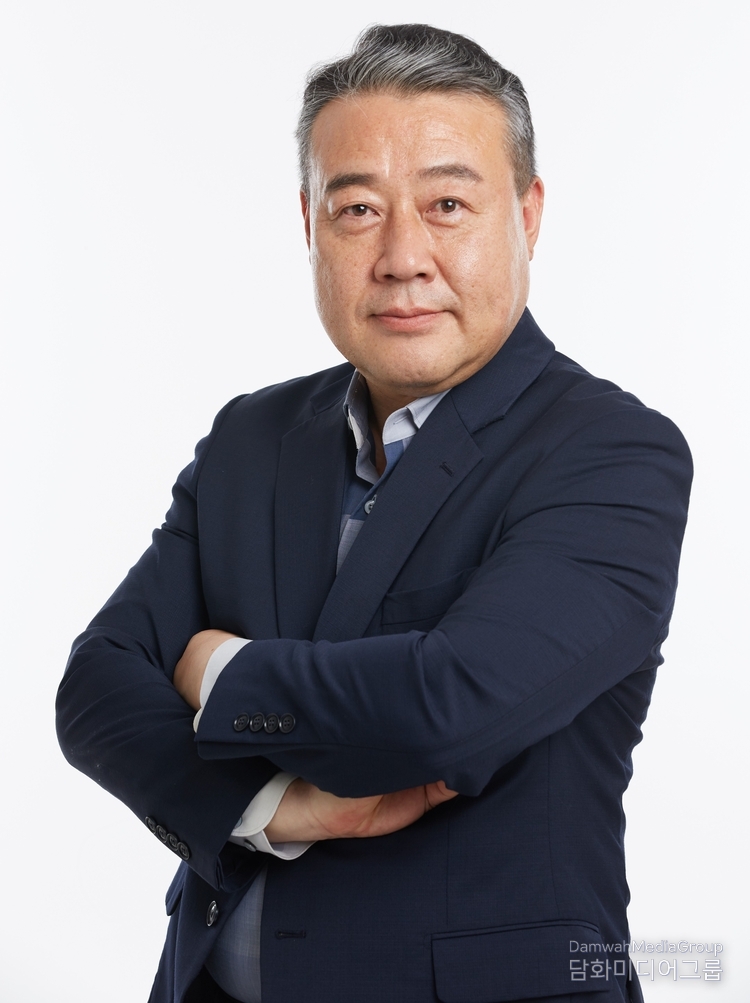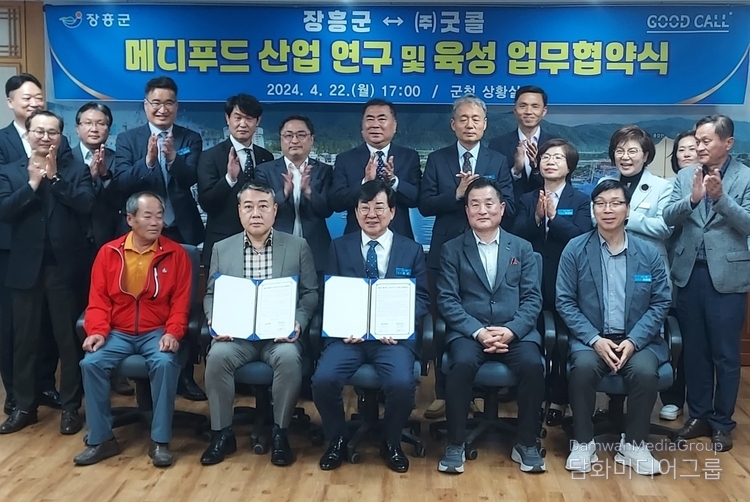By Diplomacy Journal Lee Joon-seok | Good Call & AT LAB, led by Chairman Lee Won-jung, are cultivating and processing high quality agricultural products (functional agricultural products) with their own patents and technologies, cultivating and distributing functional agricultural products with local governments and local agricultural cooperatives in various parts of Korea, and conducting safety and efficacy evaluation projects (animal experiments) with the Korea Institute of Oriental Medicine and efficacy evaluation projects (clinical trials) with Wonkwang Oriental University Hospital. In line with the current global interest in K-food, they are currently conducting a formalized certification project through the K-super food business by identifying the scientific effects of agricultural products.

K-Super Foods, which are recognized as the world's top 10 super foods for their main effects such as vitamins, minerals, and antioxidants, improve the quality and productivity of any crops in terms of functionality and strengthen disease resistance, especially through patented technology to detoxify the toxicity of sulfur, one of our own technologies, and patented technology for fertilizers using detoxified sulfur, which improves the agricultural management environment, and cultivates and processes premium agricultural products that are healthy and do not harm the natural environment with pesticide-free ingredients. The Diplomacy Journal would like to introduce companies that are developing low-cost, high-efficiency, and competitive medifood and medifoodtech industries as policy projects with Jangheung-gun, Jeollanam-do.
In particular, in September of this year, Jangheung-gun, Jeollanam-do, Jeollanam-do Bio Promotion Agency, Korea Institute of Oriental Medicine, and Good Call were invited to an event to introduce Korean food and medicinal food at the invitation of Washington State, USA, and are working to lead the strategic export industry of processed food by promoting healthy Korean food, special nutritional food, and processed food representing Korea.
In particular, Good Call's sulfur rice has a high content of sulfur, which is superior to ordinary rice, with a good taste and texture, and has been proven to be safe in a toxicity evaluation by the Korea Institute of Oriental Medicine, and has proven its effectiveness in sterilizing Salmonella and E. coli, which cause food poisoning.

Animal tests are currently underway, and the certification project for agricultural products that have excellent functions such as suppressing obesity in the era of avoiding carbohydrates, alleviating diabetes and enhancing immunity is expected to be completed around August this year.
Currently, they are in talks to enter the market for wheat, which is consumed more than rice, in Central Asia and the U.S., which are huge grain-growing regions, and are also in talks with Indonesia and Malaysia, which are global palm oil producers.
In addition, they are also looking to enter the feed market for livestock using by-products of functional agricultural products. In addition, the companies are loved by many farmers because it is able to stabilize cultivation through organic certification by suppressing and treating pests whose effects are weakened by various environmental factors even with toxic pesticides.

- May the farmer who works with sweat be prosperous.
- May the local economy be revitalized.
- May the health of the people improve.
Looking ahead, we face challenging issues of climate change, population growth, sovereignty and security of future food resources, and environmental conservation. But these challenges can also be opportunities. We would like to introduce two companies that are seizing these opportunities and leading innovation in agriculture. Lee Won-jung is the chairman of Good Call and AT LAB.
Chairman Lee is growing crops that are more functional and productive than the world's top 10 super foods. In particular, he grows, processes, and distributes premium pesticide-free agricultural products by utilizing a patented technology that removes the toxicity of sulfur. Based on these technologies, he is working with Jangheung-gun, Jeollanam-do, to promote the medifood and medifoodtech industries as policy projects.
In September 2024, Jangheung-gun, Jeollanam-do, the Jeollanam-do Bio Promotion Agency, the Korea Institute of Oriental Medicine, and Good Call will be invited to introduce healthy Korean food, special nutritional food, and processed food representing Korea at an event to introduce Korean food and medicinal food in Washington, USA. This will lead to a strategic export industry in the processed food category.
Good Call's sulfur rice has an excellent taste and texture due to its high sulfur content, which is superior to regular rice, and has been proven to be safe by toxicity evaluation by the Korea Institute of Oriental Medicine. In addition, it has been proven to sterilize Salmonella and E. coli, which cause food poisoning. It is currently in the animal testing stage, and the certification project for agricultural products with excellent functions such as obesity suppression, diabetes relief, and immunity enhancement is expected to be completed around August 2024.

They are in talks to enter the wheat cultivation market in Central Asia and the United States, and they are also in talks with palm oil producing countries such as Indonesia and Malaysia. They also want to enter the livestock feed market using by-products of functional agricultural products. They maximize the effectiveness of non-toxic pesticides, support stable cultivation through pest suppression and treatment effects, and are loved by many farmers.
Good Call and AT LAB, want to lead the future through agriculture. They hope to create a healthy future together.
Through this business, they plan to achieve the following goals.
To improve the quality of functional agricultural products, they will utilize patented sulfur detoxification technology to enhance the functionality of crops and increase productivity.
For eco-friendly agriculture, they will use pesticide-free fertilizers to realize agriculture that do not harm the natural environment.
They plan to develop high-value-added medicinal foods by cultivating highly functional agricultural products to produce premium foods that are beneficial to health, and lead the medicinal food and medicinal food technology industries.
To revitalize the local economy, they will cooperate with Jangheung-gun, Jeollanam-do to contribute to the revitalization of local agriculture and economic development.

In order to expand into the global market, they will develop medicinal foods that are competitive in domestic and international markets and enter the global market.
Good Call and AT LAB will lead the future of agriculture through continuous research and development and innovation, contribute to the improvement of people's health with healthy food, and do their best to ensure the success of farmers and the development of the local economy.
As K-food is gaining global attention, it is very important to identify the scientific effectiveness of agricultural products as K-super foods and to conduct official certification projects. To globalize this, the following factors will be implemented.
In particular, high quality control and safety must be ensured to succeed in the global market. They will acquire certifications that meet international standards and continuously manage quality.
In addition to technological innovation, they will improve productivity and quality by advancing existing technologies and introducing new technologies, and focus on the development of eco-friendly and sustainable agricultural technologies.
For brand building, it is important to build and strengthen the brand image of K-Super Foods, so they plan to create a company that can be trusted by consumers.

Localization strategies will play an important role in product development and marketing, reflecting the food culture and consumer preferences of each country as needed.
In order to effectively enter the global market, they will expand their local distribution network and build an efficient logistics system.
A successful K-food business must be accompanied by the necessary policies, so the government should support research and development (R&D) to promote agricultural technology innovation. This will help develop high-quality and functional agricultural products and secure international competitiveness.
This calls for a range of supportive policies to help access foreign markets and promote exports. This should include support for trade agreements, export insurance, financial assistance, and international marketing support.
Companies should also establish quality management and certification systems that meet international standards to increase the credibility of K-Super foods.
In addition, a global campaign to promote the efficacy and value of K-super foods through global promotion campaigns, utilizing social media, online marketing, and TV commercials, will ensure future success.
They need to develop K-food experience events and run programs that allow people to experience K-super foods locally and increase contact with consumers and promote the superiority of K-foods through cooking classes, tasting events, etc.
They should collaborate with celebrity chefs to develop recipes utilizing K-super foods and promote them through mass media.
Collaborating with local influencers and encouraging them to introduce K-Super Foods is a natural way to reach local consumers.
These factors and strategies should be used to promote the globalization of K-superfoods and ensure their success in the global marketplace.

Understanding the opportunities and challenges for the future of agriculture and the issues related to rice production is also an important topic for the United Nations. This will help shape agricultural policy, address hunger, and increase the production and utilization of functional rice.
The future and opportunities of agriculture are driven by technological innovations, such as smart agriculture, drone technology, and precision agriculture, which can significantly improve agricultural productivity. The Food and Agriculture Organization of the United Nations (FAO) also emphasizes sustainable and efficient agriculture through the adoption of these technologies.
Sustainable agriculture through eco-friendly farming is key to the future of agriculture. Organic farming, regenerative farming, and other methods will be able to maintain productivity while doing less harm to the environment.
There is a growing demand for functional agriculture, i.e., agricultural products with health benefits. This provides new market opportunities for farmers and a great opportunity to improve the health of consumers.
Addressing global hunger and rice production remains a serious problem. According to the United Nations World Food Program (WFP), approximately 810 million people are chronically hungry as of 2022. That's about 10% of the world's population.
Rice is one of the world's main food resources, and is an important staple food, especially in Asia. However, in many countries, rice production has not kept pace with population growth. Problems such as climate change, soil degradation, and water scarcity have made rice production difficult.
Asian countries such as China, India, Indonesia, and Bangladesh are the main producers of rice. However, population growth and climate change could lead to an imbalance of rice supply and demand in these countries.
Currently, there is a need to increase rice production and the following approaches are needed to increase rice production.
To overcome this, the introduction of technology in rice production will increase productivity by developing new varieties and introducing mechanization and precision agriculture technologies.
Based on the organic certification standards set by Good Call & AT LAB, they will promote the production and consumption of safe and high value-added organic rice by systematically conducting regular on-site inspections, establishing corporate partnerships with overseas agricultural research institutes, and conducting campaigns to promote the consumption of organic rice.
In addition, to strengthen competitiveness in the global market and promote sustainable agricultural development through international cooperation, they plan to create an educational program on organic cultivation technology and strengthen international cooperation through technical resource exchange.
Regarding the future and prospects of functional rice, which the companies have developed, rice is rice fortified with health-beneficial ingredients and has great potential as a future food resource. The future outlook for functional rice is as follows:
As the health epidemic increases health concerns, the demand for functional rice, such as obesity control, diabetes mitigation, and immunity enhancement, will increase.
The future of agriculture at the United Nations can be significantly improved through technological innovation, eco-friendly agriculture, and investment in functional agricultural products. Increasing rice production is essential to tackling global hunger, which requires sustainable agricultural techniques and international cooperation. Functional rice is set to become an important future food resource along with the growing interest in health, and Good Call & AT LAB will do their best to develop functional rice and conduct sustainable research so that research and policy support can continue.







